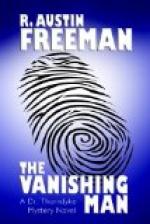“You are magnifying the difficulty, Jervis,” said Thorndyke. “The body may, of course, be anywhere in the entire world, but the place where it is lying is either inside or outside the general boundary of these two parishes. If it has been deposited within the boundary of those two parishes, the fact must be ascertainable by examining the burial certificates issued since the date when the missing man was last seen alive and by consulting the registers of those specified places of burial. I think that if no record can be found of any such interment within the boundary of those two parishes, that fact will be taken by the Court as proof that no such interment has taken place, and that therefore the body must have been deposited elsewhere. Such a decision would constitute George Hurst the co-executor and residuary legatee.”
“That is cheerful for your friends, Berkeley,” Jervis remarked, “for we may take it as pretty certain that the body has not been deposited in any of the places named.”
“Yes,” I agreed gloomily, “I’m afraid there is very little doubt of that. But what an ass the fellow must have been to make such a to-do about his beastly carcass? What the deuce could it have mattered to him where it was dumped, when he had done with it?”
Thorndyke chuckled softly. “Thus the irreverent youth of to-day,” said he. “But yours is hardly a fair comment, Berkeley. Our training makes us materialists, and puts us a little out of sympathy with those in whom primitive beliefs and emotions survive. A worthy priest who came to look at our dissecting-room expressed surprise to me that students, thus constantly in the presence of relics of mortality, should be able to think of anything but the resurrection and the life hereafter. He was a bad psychologist. There is nothing so dead as a dissecting-room ‘subject’; and the contemplation of the human body in the process of being quietly taken to pieces—being resolved into its structural units like a worn-out clock or an old engine in the Mr. Rapper’s yard—is certainly not conducive to a vivid realisation of the doctrine of the resurrection.”
“No; but this absurd anxiety to be buried in some particular place has nothing to do with religious belief; it is mere silly sentiment.”
“It is sentiment, I admit,” said Thorndyke, “but I wouldn’t call it silly. The feeling is so widespread in time and space that we must look on it with respect as something inherent in human nature. Think—as doubtless John Bellingham did—of the ancient Egyptians, whose chief aspiration was that of everlasting repose for the dead. See the trouble they took to achieve it. Think of the Great Pyramid, or that of Amenemhat the Fourth with its labyrinth of false passages and its sealed and hidden sepulchral chamber. Think of Jacob, borne after death all those hundreds of weary miles in order that he might sleep with his fathers, and then remember Shakespeare and his solemn adjuration to posterity to let him rest undisturbed in his grave. No, Berkeley, it is not a silly sentiment. I am as indifferent as you as to what becomes of my body ‘when I have done with it,’ to use your irreverent phrase; but I recognise the solicitude that some other men display on the subject as a natural feeling that has to be taken seriously.”




